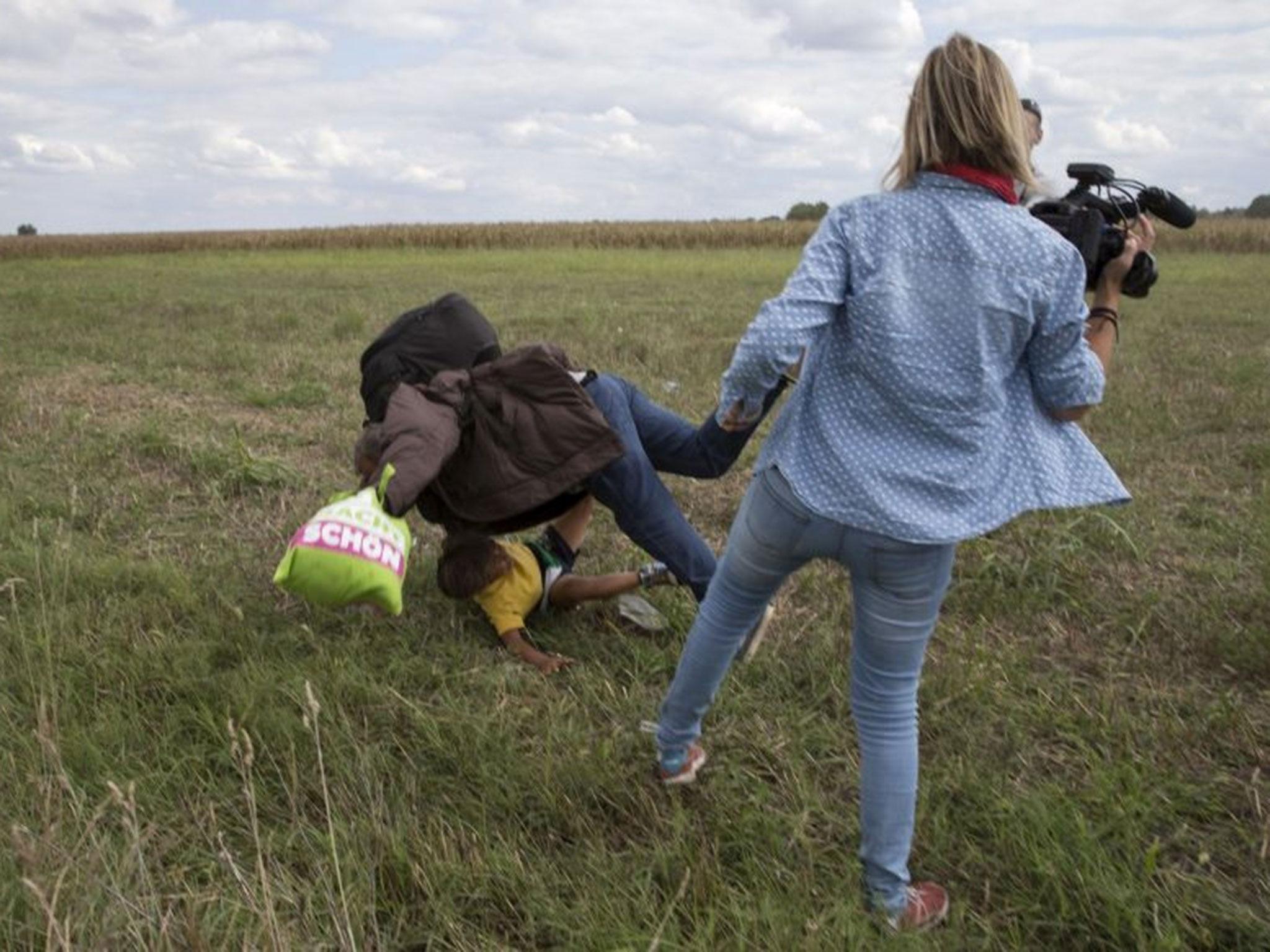Hungarian camerawoman avoids jail after being filmed tripping up and kicking refugees
Judge tells Petra László her behaviour 'ran counter to societal norms'

A Hungarian camerawoman who was filmed kicking and tripping up refugees as they ran from police has escaped jail for breaching the peace.
Petra László was handed three years' probation for the incident in September 2015 at Szeged District Court.
Footage showed her tripping up a refugee as he an through a field carrying his young son, as well as kicking a small girl as hundreds of asylum seekers broke through police lines near the Hungarian border to make their way towards Budapest.

László mounted a tearful defence in court, where she appeared on Thursday via video link, and vowed to appeal her conviction.
“It was all over within two seconds,” she said. “Everybody was shouting…it was very frightening.”
But judge Illes Nanasi told László her behaviour “ran counter to societal norms” and said the facts of the case did not support her claim to be acting in self defence.
Breach of the peace carries a maximum sentence of two years in prison under Hungarian law but she will not face jail unless she violates the terms of her probation.
The court reached its verdict after watching a frame-by-frame examination of László's actions during chaotic scenes in Röszke, on the Serbian border, on 8 September 2015.
She was filming at a nearby reception centre for the online television channel N1TV when asylum seekers attempting to pass through Hungary on their way to Western Europe broke through a police cordon and started running past.

Footage of László's reaction was swiftly shared by other journalists at the scene on social media, sparking international outrage and her swift dismissal from N1TV, which has links to Hungary’s far-right Jobbik party.
Her lawyer, Ferenc Sipos, said she could not appear in court in person after receiving death threats and would appeal the conviction.
“It is not a crime if somebody acts to defend herself...she was in danger, and she tried to avert this danger with her actions,” he told the Associated Press.
László said her life was “ruined” by the footage in an interview with the Izvestia newspaper, and threatened to sue Facebook over threats and defamatory comments.
The man she tripped up, sending him and his son crashing to the ground, has since moved to Spain and been hired as a football coach in Madrid.
Osama Abdul Mohsen, also known as Osama al-Ghadab, and his family lived in the eastern Syrian province of Deir ez-Zor but fled in 2013 when fighting intensified in the region.
He said he joined peaceful demonstrations against Bashar al-Assad’s government during the 2011 Arab Spring and then had to resign from his position with the regime’s sport federation.
During the backlash sparked by László’s case, critics accused him of supporting the al-Qaeda-linked Jabhat al-Nusra rebel group but Mr Mohsen denied the allegations, which appeared to stem from a Facebook picture incorrectly thought to display the group’s flag.
“I just want a better life,” he said. “I just want to live peacefully with my family and my friends.”
Nearly 400,000 migrants passed through Hungary in 2015 but the flow has slowed to a trickle after Prime Minister Viktor Orban ordered the construction of a barbed wire fence along its border and increased patrols.
Since the EU-Turkey deal was struck in March last year to slow boat crossings over the Aegean Sea, the majority of migrants arriving in Europe have crossed from North Africa to Italy and continued their journeys from there, rather than travelling through the Balkans from Greece.
Thousands of refugees remain trapped by border closures and security crackdowns in freezing temperatures across Europe, with several dying from hypothermia, while more than 5,000 migrants died in treacherous boat crossings last year.
Join our commenting forum
Join thought-provoking conversations, follow other Independent readers and see their replies
0Comments